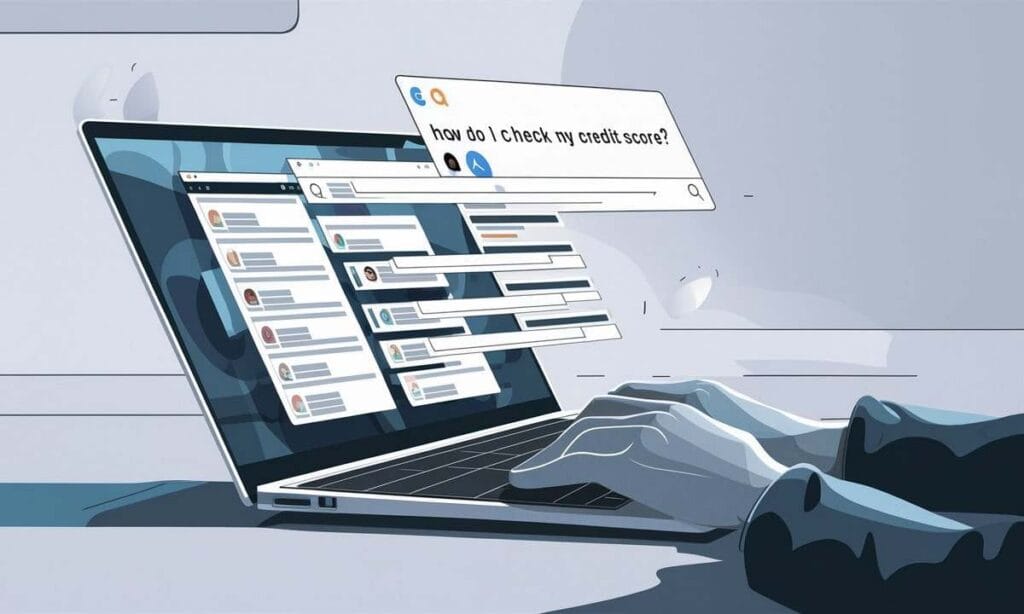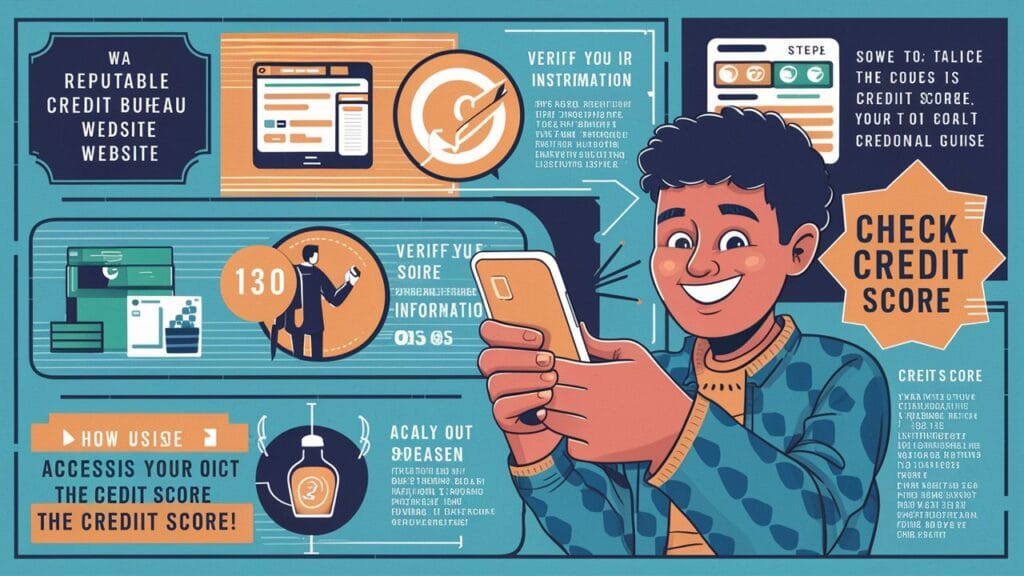A Credit Score is more than just a number & it’s a reflection of your financial behavior and trustworthiness in the eyes of lenders. This three-digit figure, typically ranging from 300 to 850, is derived from your credit history and is used by banks, credit card companies, and other financial institutions to assess the risk of lending you money. Essentially, it quantifies your creditworthiness based on various factors like payment history, credit utilization, length of credit history, and more. A higher score indicates lower risk and suggests that you are more likely to repay borrowed funds on time.

The Importance of Monitoring Your Credit Score
Regularly monitoring your Credit Score is crucial for maintaining financial health. It serves as an early warning system, alerting you to potential issues such as unauthorized credit inquiries or fraudulent activity. Beyond security, keeping tabs on your score helps you understand how financial decisions—like opening new accounts or paying down debt—affect your creditworthiness. This proactive approach ensures you are always prepared, whether you’re planning to apply for a mortgage, secure a loan, or negotiate better terms on a credit card.
How Credit Scores Impact Your Financial Health
Your Credit Score influences nearly every aspect of your financial life. A strong score can unlock lower interest rates on loans, higher credit limits, and better insurance premiums. Conversely, a low score can lead to higher borrowing costs, difficulty securing rental housing, and even affect job prospects in certain industries. Understanding how this number shapes your financial opportunities underscores the importance of maintaining a healthy score.
Why You Should Check Your Credit Score Regularly
Preventing Identity Theft and Fraud
Identity theft is a growing concern in the digital age. Regularly checking your Credit Score can help you detect suspicious activity early, such as unexpected credit inquiries or accounts you didn’t open. By catching these red flags promptly, you can take immediate action to mitigate damage, such as freezing your credit or contacting the affected financial institutions.
TAKING IN Loan and Credit Eligibility
Knowing your Credit Score gives you a clearer picture of where you stand when applying for loans or credit cards. Lenders use your score to determine not just whether to approve you, but also the terms they’ll offer. A strong score can mean the difference between a favorable interest rate and one that significantly increases your debt burden. By monitoring your score, you’ll be better prepared to negotiate or shop around for the best deals.
Keeping Track of Your Financial Progress
Monitoring your Credit Score over time provides valuable insights into your financial habits. Are you consistently paying bills on time? Are you carrying too much debt? Watching how your score responds to these behaviors can help you make more informed decisions about managing credit, paying down debt, and planning for future financial goals.

Different Types of Credit Scores
FICO vs. VantageScore: What’s the Difference?
BOTH FICO and VantageScore are the two primary credit scoring models, but they differ in their approach and calculation. FICO, used by 90% of top lenders, emphasizes payment history, amounts owed, length of credit history, new credit, and credit mix. VantageScore, while similar, places more weight on recent credit behavior and trends. Understanding the distinctions between these models can help you interpret your score more accurately, depending on which score a lender is likely to use.
How Lenders Use Different Credit Scores
Lenders don’t just look at one score; they may pull multiple Credit Scores from different bureaus or use industry-specific models tailored to the type of credit you’re seeking, such as auto loans or mortgages. Each score can vary slightly depending on the data each bureau has, making it essential to be aware of how these differences might affect your borrowing options.
Which Credit Score Should You Focus On?
While both FICO and VantageScore are important, focusing on FICO is often more practical, given its widespread use among lenders. However, regularly checking both can provide a comprehensive view of your credit health, as each may highlight different aspects of your financial behavior.
How Often Should You Check Your Credit Score?
The Ideal Frequency for Monitoring Your Credit
Checking your Credit Score at least once a month is advisable, particularly if you are planning a significant financial move like applying for a loan or mortgage. Monthly checks allow you to spot changes early and take corrective action if necessary.
When to Check Your Credit Score Before Major Financial Decisions
Before making any major financial decisions—such as buying a home, refinancing a loan, or applying for a new credit card—ensure your Credit Score is in good shape. Reviewing your score a few months in advance gives you time to address any discrepancies or improve your score if needed.
How Frequent Monitoring Can Improve Your Financial Habits
Regular Credit Score monitoring can reinforce good financial habits. By observing how actions like paying down debt or opening new credit lines impact your score, you can adjust your behavior to maintain or improve your credit standing.

Free Resources to Check Your Credit Score
Top Websites Offering Free Credit Scores
Numerous websites offer free access to your Credit Score, including well-known platforms like Credit Karma, Credit Sesame, and AnnualCreditReport.com. These sites provide not only your score but also detailed insights into the factors influencing it.
Mobile Apps That Provide Free Credit Score Access
Mobile apps like Mint, CreditWise from Capital One, and Experian’s app allow you to monitor your Credit Score on the go. These apps offer real-time updates, alerts, and personalized advice on how to improve your score.
How to Access Your Credit Score Through Your Bank or Credit Card Issuer
Many banks and credit card issuers now offer free Credit Score access as a customer perk. Services like Discover’s Credit Scorecard or Chase’s Credit Journey provide easy access to your score directly through their online banking platforms.
How to Check Your Credit Score Without Hurting It
Understanding Soft vs. Hard Inquiries
When you check your own Credit Score, it’s considered a soft inquiry, which does not affect your score. Hard inquiries, however, occur when lenders check your score as part of a credit application, which can temporarily lower your score. Knowing the difference ensures you can monitor your credit without fear of negative consequences.
Why Checking Your Own Credit Score Won’t Lower It
Unlike hard inquiries, soft inquiries have no impact on your Credit Score. This means you can check your score as often as you like without any risk of lowering it. This is crucial for maintaining a proactive approach to your financial health.
Best Practices for Monitoring Your Score Without Negative Impact
To monitor your Credit Score without negatively affecting it, use soft inquiry services and space out applications for new credit to minimize the impact of hard inquiries. This strategy helps maintain a stable score while keeping you informed.
Step-by-Step Guide to Checking Your Credit Score Online
Creating Accounts on Credit Monitoring Sites
Start by choosing a reputable credit monitoring site like Credit Karma or AnnualCreditReport.com. Sign up for an account, providing necessary information such as your Social Security number and date of birth. These sites require secure information to verify your identity and provide accurate credit information.
Navigating the Dashboard: What to Look For
Once logged in, you’ll be taken to a dashboard that displays your Credit Score along with a summary of your credit accounts, inquiries, and payment history. Pay close attention to any significant changes or alerts that indicate potential issues with your credit.
How to Save and Track Your Credit Score Over Time
Most credit monitoring services offer tools to track your Credit Score over time. Use these tools to download reports, set up alerts for score changes, and create a log of your progress. This tracking allows you to see how your actions affect your score month by month.
How to Interpret Your Credit Score
TAKING IN Credit Score Ranges: What’s Good, Bad, and Excellent
Credit Scores are typically categorized into ranges: poor (300-579), fair (580-669), good (670-739), very good (740-799), and excellent (800-850). Understanding where your score falls within these ranges helps you gauge your creditworthiness in the eyes of lenders.
Breaking Down the Factors That Influence Your Score
Your Credit Score is influenced by several factors, including payment history (35%), amounts owed (30%), length of credit history (15%), new credit (10%), and credit mix (10%). Knowing how each factor contributes to your overall score can guide your efforts to improve it.
What to Do If Your Score Isn’t What You Expected
If your Credit Score is lower than expected, review your credit report for errors, high credit utilization, or late payments. Identifying the cause allows you to take corrective action, whether that’s disputing an error or paying down debt.
Common Mistakes to Avoid When Checking Your Credit Score
Falling for Free Credit Score Scams
Be cautious of websites or services that promise free Credit Scores but require your credit cardinformation or charge hidden fees. Stick to reputable sources like Credit Karma or directly through your bank.
Relying on Just One Source for Your Score
Your Credit Score can vary slightly between different credit bureaus. To get a comprehensive view, check your score across multiple sources, including all three major credit bureaus: Experian, Equifax, and TransUnion.
Ignoring Important Details in Your Credit Report
Your credit report contains more than just your score; it includes detailed information about your credit accounts, inquiries, and payment history. Don’t overlook this information, as it can provide valuable insights into areas that need attention.
How to Dispute Errors on Your Credit Report
Identifying Common Errors That Affect Your Score
Common errors on credit reports include incorrect account information, duplicate accounts, and inaccurate payment history. These mistakes can significantly lower your Credit Score, so it’s essential to review your report carefully.
The Step-by-Step Process for Filing a Dispute
To dispute an error, contact the credit bureau that issued the report, either online or by mail. Provide a detailed
explanation of the error, include any supporting documentation, and request an investigation. The bureau is required to investigate within 30 days.
How Long It Takes to Resolve Credit Report Errors
Once you’ve filed a dispute, it typically takes 30 to 45 days for the credit bureau to investigate and resolve the issue. During this time, they will contact the creditor in question and review the documentation provided. If the error is confirmed, your credit report will be updated accordingly.
How to Improve Your Credit Score Over Time
Strategies for Paying Down Debt
Paying down debt is one of the most effective ways to improve your Credit Score. Focus on high-interest debt first, while making at least minimum payments on other accounts. Consider debt consolidation if you have multiple high-interest debts, as it can simplify payments and potentially lower your overall interest rate.
Building a Strong Credit History with New Credit
Opening a new credit account can help build your credit history, but it’s essential to use it wisely. Keep balances low, make payments on time, and avoid opening too many new accounts in a short period, as this can lower your score.
The Role of Timely Payments in Boosting Your Score
Payment history is the most significant factor in your Credit Score, so paying bills on time is crucial. Set up automatic payments or reminders to ensure you never miss a due date. Even one late payment can have a substantial impact on your score.
The Impact of Your Credit Report on Your Score
How Your Credit Report and Score Are Connected
Your credit report is a detailed record of your credit history, and your Credit Score is derived from the information in that report. Any changes in your credit report, such as new accounts, inquiries, or changes in account balances, can affect your score.
How Often Credit Reports Are Updated
Credit reports are typically updated monthly as creditors report your account activity to the credit bureaus. However, not all creditors report to all three bureaus, which can lead to slight variations in your credit reports and scores.
What to Do If Your Credit Report Contains Negative Information
If your credit report contains negative information, such as late payments or defaults, focus on building positive credit habits moving forward. Negative information can stay on your report for up to seven years, but its impact on your score lessens over time.
TAKING IN the Role of Credit Bureaus
The Big Three: Experian, Equifax, and TransUnion
Experian, Equifax, and TransUnion are the three major credit bureaus in the United States. Each bureau collects information from creditors and compiles it into a credit report, which is used to calculate your Credit Score. Understanding how these bureaus operate helps you better navigate the credit system.
How Credit Bureaus Collect and Report Information
Credit bureaus collect data from a variety of sources, including banks, credit card companies, and other lenders. They compile this information into your credit report, which is then used to calculate your Credit Score. Regularly reviewing your report from each bureau ensures accuracy and consistency.
Why Your Credit Score Might Differ Between Bureaus
Your Credit Score can vary between bureaus because not all creditors report to all three, and each bureau may receive slightly different information. This is why it’s essential to check your reports from all three bureaus to get a complete picture of your credit health.
Should You Pay for a Credit Monitoring Service?
The Benefits of Premium Credit Monitoring
Premium credit monitoring services offer additional features like identity theft protection, detailed credit reports, and instant alerts for significant changes to your credit. These services can provide peace of mind, especially if you’re concerned about fraud or want to stay on top of your credit health.
Free vs. Paid Credit Monitoring: Which Is Right for You?
Free credit monitoring services are a great option for basic score tracking and alerts, while paid services offer more comprehensive protection and features. Consider your financial situation and needs when deciding which type of service is best for you.
How to Choose the Best Credit Monitoring Service
When choosing a credit monitoring service, consider factors like cost, the frequency of updates, additional features like identity theft protection, and customer reviews. A good service should provide timely alerts, easy access to your credit reports, and helpful customer support.
How to Protect Your Credit Score from Fraud
Recognizing the Signs of Identity Theft
Common signs of identity theft include unexpected credit inquiries, unfamiliar accounts on your credit report, and receiving bills for items you didn’t purchase. Being vigilant about these signs can help you catch identity theft early and minimize damage.
Steps to Take if Your Credit Score Suddenly Drops
If your Credit Score suddenly drops, review your credit report immediately to identify the cause. Look for new accounts, hard inquiries, or missed payments that could be affecting your score. If you find errors or fraudulent activity, take action to correct them as soon as possible.
The Importance of Freezing Your Credit in Certain Situations
Freezing your credit prevents new creditors from accessing your credit report, making it harder for identity thieves to open accounts in your name. Consider freezing your credit if you suspect fraud, have lost your personal information, or are not planning to apply for new credit in the near future.
How Life Events Can Affect Your Credit Score
The Impact of Marriage, Divorce, and Other Major Life Changes
Marriage and divorce can both impact your Credit Score, depending on how you manage shared accounts and debts. For example, if you co-sign on a loan with your spouse, both your Credit Scores are affected by how that debt is managed. Understanding how life changes impact your score can help you make better financial decisions during these transitions.
How Job Loss or a New Job Can Influence Your Credit
Losing a job or starting a new one can affect your credit if it leads to changes in your income or financial obligations. For example, if job loss results in missed payments, your Credit Score may suffer. Conversely, a new job with higher income can help you pay down debt and improve your score.
The Effect of Large Purchases on Your Credit Score
Making large purchases, especially on credit, can temporarily lower your Credit Score by increasing your credit utilization ratio. If you’re planning a big purchase, consider how it will impact your score and whether it’s better to pay with cash or credit.
What to Do If You Don’t Have a Credit Score
Why You Might Not Have a Credit Score Yet
You may not have a Credit Score if you’ve never opened a credit account, are new to the country, or have limited credit history. Without a score, it can be challenging to qualify for loans or credit cards, but there are steps you can take to establish one.
Steps to Establishing Your First Credit Score
To establish your first Credit Score, start by opening a secured credit card or becoming an authorized user on someone else’s account. Use the card responsibly by making small purchases and paying off the balance in full each month. Over time, these actions will help you build a credit history and establish a Credit Score.
How to Build Credit from Scratch
Building credit from scratch requires patience and consistency. Start by opening a credit account, making on-time payments, and keeping your credit utilization low. Over time, these habits will help you build a strong credit history and improve your score.
How Credit Scores Differ Internationally
TANKING IN Credit Scores in the U.S. vs. Other Countries
Credit scoring systems vary from country to country, with different factors and scales used to assess creditworthiness. For example, while the U.S. uses FICO and VantageScore, other countries may use entirely different models. Understanding these differences is important if you’re moving abroad or planning to apply for credit in another country.
Challenges for Expats Checking Their Credit Score
Expats often face challenges when checking their Credit Scores in a new country, as they may not have a credit history there. It’s important to establish credit as soon as possible by opening local accounts and using them responsibly.
How to Maintain a Good Credit Score When Moving Abroad
To maintain a good Credit Score when moving abroad, keep your U.S. credit accounts open and active, if possible. Make sure to monitor your U.S. credit report regularly, and consider using international credit cards that report to both U.S. and foreign credit bureaus.
How to Use Your Credit Score to Your Advantage
Negotiating Better Interest Rates with a High Score
A high Credit Score can be a powerful tool when negotiating interest rates on loans, credit cards, and mortgages. Lenders are more likely to offer favorable terms to borrowers with excellent credit, so use your score as leverage to secure better rates.
Leveraging Your Credit Score for Better Credit Card Rewards
Credit card companies offer the best rewards programs to customers with high Credit Scores. Use your score to qualify for cards with cashback, travel rewards, or other benefits that align with your spending habits.
The Role of Your Credit Score in Renting or Buying a Home
Your Credit Score plays a significant role in both renting and buying a home. Landlords and mortgage lenders use it to assess your reliability as a tenant or borrower. A strong score can help you secure better rental terms or lower mortgage interest rates.
The Future of Credit Scoring
Emerging Trends in Credit Score Calculation
The future of credit scoring may involve alternative data, such as utility payments and rental history, which could provide a more comprehensive view of an individual’s financial behavior. These trends are likely to make Credit Scores more inclusive, especially for those with limited credit history.
How Technology Is Changing the Way We Monitor Credit
Technology is making it easier than ever to monitor your Credit Score. From mobile apps to AI-driven insights, consumers have more tools at their disposal to stay on top of their credit health. These advancements are likely to continue, offering even more personalized and proactive credit monitoring solutions.
The Potential Impact of Alternative Credit Scoring Models
Alternative credit scoring models, such as those using non-traditional data, could revolutionize the credit industry. These models aim to provide credit
Frequently Asked Questions (FAQs)
How do I find my Credit Score?
You can find your Credit Score through various free and paid sources. Websites like Experian, Equifax, and TransUnion offer free access to your Credit Score, and many banks and credit card companies provide score updates as well.
Can I run my own Credit Score?
Yes, you can run your own Credit Score without affecting it. Checking your own Credit Score is considered a soft inquiry and does not impact your credit rating.
How can I check my Credit Score without a hit?
To check your Credit Score without impacting it, use services that perform soft inquiries. Many credit monitoring tools and websites provide free access to your score without affecting it. Source
What’s a bad Credit Score?
A Credit Score below 600 is generally considered poor. Scores in this range can make it difficult to qualify for loans or credit cards and may lead to higher interest rates.
How rare is 825 Credit Score?
An 825 Credit Score is considered exceptionally rare and signifies excellent credit health. Fewer individuals reach this level, as it represents the top echelon of Credit Scores.
How rare is an 800 Credit Score?
An 800 Credit Score is very rare and denotes excellent creditworthiness. It is a significant achievement and is reached by only a small percentage of individuals.
What is the highest Credit Score in the world?
The highest Credit Score possible varies by country and credit scoring model. In the U.S., a perfect FICO score is 850. Internationally, other countries have different maximum scores based on their own systems.
Is 777 a good Credit Score?
A 777 Credit Score is considered very good. It indicates strong credit health and should enable you to secure favorable loan terms and interest rates.
How much money can I borrow with a 700 Credit Score?
With a 700 Credit Score, you can generally borrow substantial amounts, such as for mortgages, auto loans, or personal loans. Lenders may offer competitive rates, although the exact amount depends on various factors.
Is 887 a good Credit Score?
An 887 Credit Score is excellent and indicates exceptional credit health. This score is well above average and should qualify you for the best interest rates and financial products.
Can a Credit Score be 300?
No, a Credit Score cannot be 300. The lowest possible Credit Score on common scales like FICO is around 300, but this is an extremely rare and poor rating.
How to get 800 Credit Score?
To achieve an 800 Credit Score, maintain a low credit utilization ratio, ensure timely payments, avoid hard inquiries, and build a long credit history with diverse types of credit.
What is a good Credit Score for my age?
A good Credit Score can vary by age but generally, a score above 700 is considered good. As you age and build more credit history, your score should ideally improve.
What is the max credit?
The maximum Credit Score typically available is 850, which is considered excellent in most credit scoring models, including FICO and VantageScore.
Does anyone have a 1000 Credit Score?
No, a 1000 Credit Score is not possible under current credit scoring models. The highest scores achievable are typically around 850.
How bad is a 850 Credit Score?
An 850 Credit Score is not bad; it is the highest score possible in most credit scoring systems and indicates exceptional creditworthiness.
Is 720 a good Credit Score?
Yes, a 720 Credit Score is considered good. It demonstrates reliable credit management and should help you qualify for loans and credit cards with favorable terms.
Is a 900 Credit Score possible?
No, a 900 Credit Score is not possible with current credit scoring models. The highest achievable scores are generally around 850.
Is 800 Credit Score bad?
No, an 800 Credit Score is excellent. It signifies superior credit health and typically qualifies you for the best financial products and interest rates.
Can I go from 500 to 700 Credit Score?
Yes, it is possible to improve your Credit Score from 500 to 700 by addressing negative credit factors, making timely payments, reducing debt, and building positive credit history.
How to get an 850 Credit Score?
Achieving an 850 Credit Score involves maintaining a perfect payment history, keeping credit utilization low, avoiding hard inquiries, and managing a long, diverse credit history.
Is 500 a good Credit Score?
No, a 500 Credit Score is considered poor. It can limit your access to credit and result in higher interest rates or difficulty securing loans.
How is a 650 Credit Score?
A 650 Credit Score is considered fair. While it may not qualify you for the best rates, it is still possible to access credit with this score, though you might face higher interest rates.
How to get 800 Credit Score from 700?
To improve your Credit Score from 700 to 800, focus on paying down existing debt, maintaining a low credit utilization ratio, ensuring timely payments, and minimizing new credit inquiries.
Is 672 a bad Credit Score?
A 672 Credit Score is generally considered fair. While not bad, it indicates that there is room for improvement to achieve better credit terms and rates.
Is 750 credit bad?
No, a 750 Credit Score is considered very good. It reflects strong credit management and should help you secure favorable financial terms and lower interest rates.
Is 620 a good Credit Score?
No, a 620 Credit Score is considered poor. It may limit your access to credit and result in higher interest rates. Improving your score will help you secure better credit terms.









